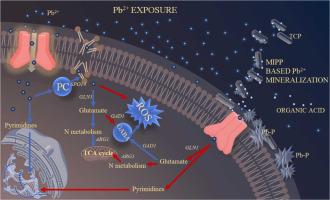Journal of Hazardous Materials ( IF 13.6 ) Pub Date : 2022-07-23 , DOI: 10.1016/j.jhazmat.2022.129675 Fei Tang 1 , Jiaru Yue 1 , Jiang Tian 1 , Fei Ge 1 , Feng Li 1 , Yun Liu 1 , Songqiang Deng 2 , Dayi Zhang 3

|
Microbial-induced phosphate (P) precipitation (MIPP) based on P-solubilizing microorganisms (PSM) is regarded as a promising approach to bioimmobilize environmental lead (Pb). Nevertheless, the underlying changes of Pb2+ biotoxicity in PSM during MIPP process were rarely discussed. The current study explored the Pb2+ immobilization and metabolic changes in PSM Penicillium oxalicum postexposure to Pb2+ and/or tricalcium phosphate (TCP). TCP addition significantly increased soluble P concentrations, accelerated extracellular Pb mineralization, and improved antioxidative enzyme activities in P. oxalicum during MIPP process. Secondary Pb2+ biomineralization products were measured as hydroxypyromorphite [Pb10(PO4)6(OH)2]. Using untargeted metabolomic and transcriptomics, we found that Pb2+ exposure stimulated the membrane integrity deterioration and nucleotide metabolism obstruction of P. oxalicum. Correspondingly, P. oxalicum could produce higher levels of gamma-aminobutyric acid (GABA) to enhance the adaptive cellular machineries under Pb2+ stress. While the MIPP process improved extracellular Pb2+ mineralization, consequently alleviating the nucleotide metabolism inhibition and membrane deterioration. Multi-omics results suggested that GABA degradation pathway was stimulated for arginine biosynthesis and TCA cycle after Pb2+ mineralization. These results provided new biomolecular information underlying the Pb2+ exposure biotoxicities to microorganisms in MIPP before the application of this approach in environmental Pb2+ remediation.
中文翻译:

微生物诱导的磷酸盐沉淀加速铅矿化以减轻核苷酸代谢抑制并改变草酸青霉的适应性细胞机制
基于溶解磷的微生物 (PSM) 的微生物诱导的磷酸盐 (P) 沉淀 (MIPP) 被认为是一种很有前景的生物固定环境铅 (Pb) 的方法。然而,很少讨论在 MIPP 过程中 PSM 中Pb 2+生物毒性的潜在变化。目前的研究探讨了PSM草酸青霉暴露于 Pb 2+和/或磷酸三钙 (TCP)后 Pb 2+的固定化和代谢变化。在MIPP过程中,添加 TCP 显着增加了可溶性 P 浓度,加速了细胞外 Pb 矿化,并改善了草酸假单胞菌的抗氧化酶活性。二次铅2+生物矿化产物被测量为羟基磷灰石[Pb 10 (PO 4 ) 6 (OH) 2 ]。使用非靶向代谢组学和转录组学,我们发现 Pb 2+暴露刺激了草酸假单胞菌的膜完整性恶化和核苷酸代谢障碍。相应地,草酸可产生更高水平的γ-氨基丁酸(GABA)以增强Pb 2+胁迫下的适应性细胞机制。而 MIPP 工艺改善了细胞外 Pb 2+矿化,从而减轻核苷酸代谢抑制和膜退化。多组学结果表明,Pb 2+矿化后,GABA 降解途径促进了精氨酸生物合成和 TCA 循环。在将该方法应用于环境 Pb 2+修复之前,这些结果为 MIPP 中 Pb 2+暴露对微生物的生物毒性提供了新的生物分子信息。


























 京公网安备 11010802027423号
京公网安备 11010802027423号